中国餐桌礼仪文化英文.doc
中国餐桌礼仪 英语作文

中国餐桌礼仪英语作文Chinese Table Manners。
China has a long history and rich culture, and its table manners are an important part of its traditional etiquette. In Chinese culture, dining is not just about eating, but also about showing respect and courtesy to others. Understanding and following Chinese table manners is essential when dining with Chinese people, whether in China or in a Chinese restaurant abroad.First and foremost, seating arrangements at a Chinese dinner table are very important. The most honored guest or the eldest person is usually seated at the head of the table, facing the door. This is a sign of respect and shows that the host values the guest's presence. Guests should wait to be seated and follow the lead of the host when taking their seats.When it comes to using chopsticks, there are severalimportant rules to follow. It is considered rude to stick chopsticks upright in a bowl of rice, as this resembles a ritual for the dead. Instead, chopsticks should be placed on a chopstick rest or on the edge of the plate. When picking up food, it is polite to use the larger end of the chopsticks, rather than the pointed end. Additionally, itis considered impolite to point with chopsticks or to pass food directly from one pair of chopsticks to another, as this is reminiscent of a funeral custom.Furthermore, it is customary to serve others before serving oneself. It is polite to offer food to others, especially to the elderly or honored guests, before taking any for oneself. When pouring tea, it is important to fill the cups of others before filling one's own cup. This shows respect and consideration for others at the table.In addition, there are specific customs related to drinking and toasting in Chinese culture. When offering a toast, it is polite to stand up and hold the glass with both hands. It is also customary to take a small sip after each toast, as a sign of respect to the person beingtoasted. It is important to pay attention to the order of toasting, as the most senior person should be toasted first. When receiving a toast, it is polite to accept the drinkwith both hands as a sign of respect.Finally, it is important to express gratitude and appreciation for the meal and the hospitality of the host.It is customary to thank the host for the meal and to express enjoyment of the food. Complimenting the host onthe taste of the dishes and the hospitality is a way to show gratitude and respect.In conclusion, Chinese table manners are an important part of Chinese culture and etiquette. Understanding and following these customs is essential when dining with Chinese people, whether in China or in a Chinese restaurant abroad. By showing respect and courtesy at the dinner table, one can build positive relationships and leave a good impression on the host and other guests.。
关于中国国风俗和餐桌礼仪的英语

关于中国国风俗和餐桌礼仪的英语
以下是一些关于中国风俗和餐桌礼仪的英语表达:
Chinese customs and traditions 中国风俗和传统
Table manners in China 中国的餐桌礼仪
Dining etiquette in Chinese culture 中国文化中的用餐礼仪
Chinese food culture 中国饮食文化
Respect for elders at the table 餐桌上对长辈的尊重
Using chopsticks properly 正确使用筷子
Not speaking with your mouth full 在口中有食物时不说话
Saying "please" and "thank you" 说“请”和“谢谢”
Not making loud noises while eating 吃饭时不发出大的声音
Waiting for everyone to be seated before starting to eat 等待所有人就座后再开始用餐
Giving compliments to the host 对主人表示赞美
Not pointing at food with chopsticks 不用筷子指着食物
Not leaving your chopsticks upright in the rice bowl 不要将筷子竖直插在饭碗里Taking turns to speak and share during meals 用餐时轮流发言和分享
这些只是一些常见的表达,具体的风俗和餐桌礼仪可能因地区和文化背景而有所不同。
(完整版)中国餐桌礼仪英文版

Eat with little noise and movement
Help people to dish the serving chopsticks ,centiliter ,not use yours
Qing Dynasty by the impact of Western food, some Western rituals have also been introduced. Such as sub-dishes, on the soup, into the wine, etc, because of reasonable health way, it was introduced into the Chinese etiquette.
Had better not pick your teeth. If you must do it ,you should screen your mouth with napin or your hands
Leave the feast
When you leave the feast,you should show your thank to the master , or invite the master to your house here after.
Lead the guest to the seat of honor,then lead the senior to the seae next to the guest
Take the seat from left
Do not start eating in a hurry or make noise
中国餐桌礼仪介绍英文作文
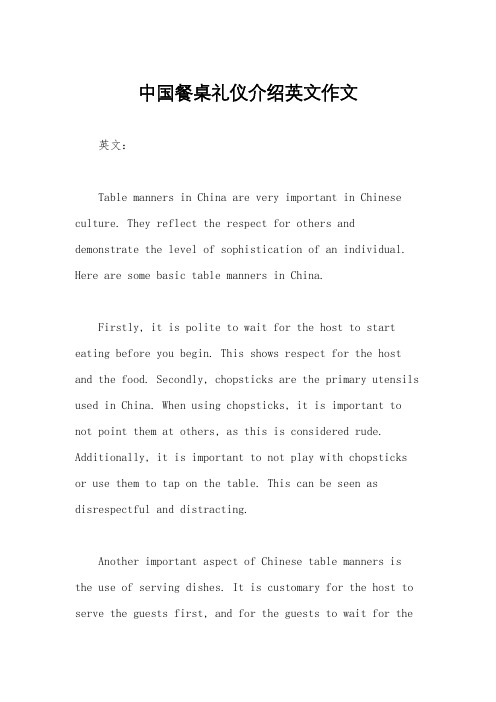
中国餐桌礼仪介绍英文作文英文:Table manners in China are very important in Chinese culture. They reflect the respect for others and demonstrate the level of sophistication of an individual. Here are some basic table manners in China.Firstly, it is polite to wait for the host to start eating before you begin. This shows respect for the host and the food. Secondly, chopsticks are the primary utensils used in China. When using chopsticks, it is important to not point them at others, as this is considered rude. Additionally, it is important to not play with chopsticks or use them to tap on the table. This can be seen as disrespectful and distracting.Another important aspect of Chinese table manners is the use of serving dishes. It is customary for the host to serve the guests first, and for the guests to wait for thehost to start eating before they begin. It is also polite to take small portions of food at a time, so that there is enough for everyone.Finally, it is important to show appreciation for the food and the host. Complimenting the food and thanking the host for the meal is a sign of respect and gratitude.中文:在中国文化中,餐桌礼仪非常重要。
中餐桌礼仪英文作文
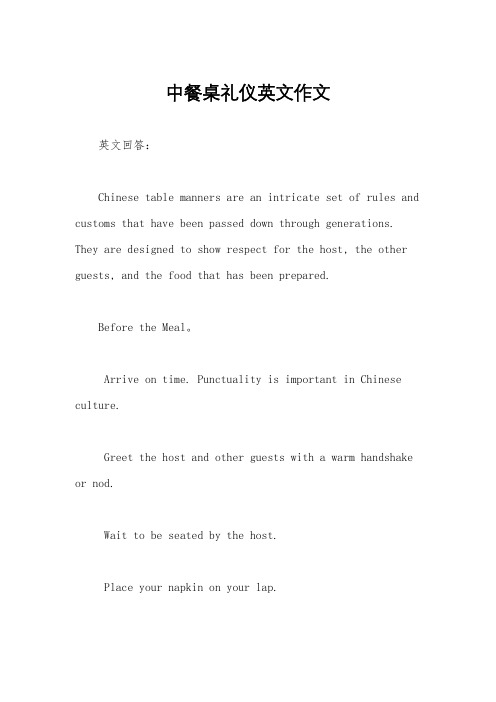
中餐桌礼仪英文作文英文回答:Chinese table manners are an intricate set of rules and customs that have been passed down through generations. They are designed to show respect for the host, the other guests, and the food that has been prepared.Before the Meal。
Arrive on time. Punctuality is important in Chinese culture.Greet the host and other guests with a warm handshake or nod.Wait to be seated by the host.Place your napkin on your lap.Use your chopsticks or a spoon to serve yourself. Do not use your hands.During the Meal。
Do not start eating until the host has invited you to do so.Chew your food with your mouth closed.Do not talk with your mouth full.Do not drink alcohol excessively.If you need to excuse yourself from the table, ask the host for permission.After the Meal。
Thank the host for the meal.Help to clean up the table.Do not leave your chopsticks in your bowl.Place your chopsticks on the table or in the chopstick holder.Additional Tips。
介绍中国的餐桌礼仪英语作文初三
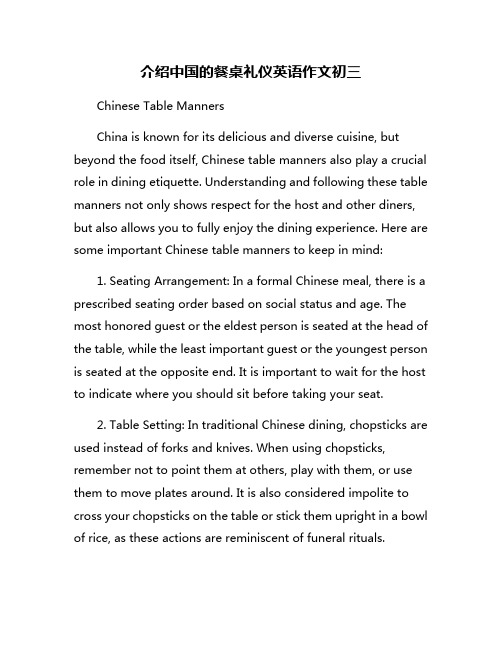
介绍中国的餐桌礼仪英语作文初三Chinese Table MannersChina is known for its delicious and diverse cuisine, but beyond the food itself, Chinese table manners also play a crucial role in dining etiquette. Understanding and following these table manners not only shows respect for the host and other diners, but also allows you to fully enjoy the dining experience. Here are some important Chinese table manners to keep in mind:1. Seating Arrangement: In a formal Chinese meal, there is a prescribed seating order based on social status and age. The most honored guest or the eldest person is seated at the head of the table, while the least important guest or the youngest person is seated at the opposite end. It is important to wait for the host to indicate where you should sit before taking your seat.2. Table Setting: In traditional Chinese dining, chopsticks are used instead of forks and knives. When using chopsticks, remember not to point them at others, play with them, or use them to move plates around. It is also considered impolite to cross your chopsticks on the table or stick them upright in a bowl of rice, as these actions are reminiscent of funeral rituals.3. Serving Etiquette: When dishes are served, it is customary to leave the best pieces for the elders or honored guests at the table. Make sure to serve others before serving yourself, and always use the serving utensils provided rather than your own chopsticks.4. Eating Etiquette: In Chinese culture, slurping and burping are considered rude behaviors at the dinner table. However, it is acceptable to make some noise while eating noodles as it signifies that you are enjoying the meal. When using a soup spoon, tilt the bowl towards you and drink directly from the side without making loud slurping noises.5. Toasting: Toasting is an important part of Chinese dining etiquette, especially during formal banquets or celebrations. When toasting, raise your glass with both hands as a sign of respect, and make sure to clink glasses with each person at the table. It is customary to take a small sip after each toast, even if the glass is filled to the brim.6. Expressing Gratitude: At the end of the meal, it is polite to thank the host for the wonderful meal and hospitality. You can do this by saying "Xie xie" (thank you) or "Fei chang gan xie" (thank you very much). It is also customary to offer a smallgesture of appreciation, such as a small gift or a red envelope with money inside.Overall, understanding and following Chinese table manners is essential when dining in China or with Chinese hosts. By showing respect for the culture and customs of the country, you can enjoy a more pleasant and authentic dining experience. So, the next time you find yourself at a Chinese dinner table, remember to keep these etiquette tips in mind and enjoy the delicious food and warm hospitality that China has to offer.。
中国餐桌礼仪英文介绍
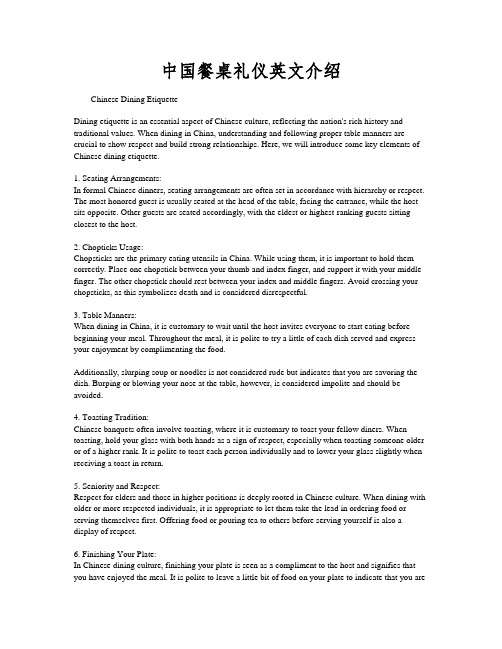
中国餐桌礼仪英文介绍Chinese Dining EtiquetteDining etiquette is an essential aspect of Chinese culture, reflecting the nation's rich history and traditional values. When dining in China, understanding and following proper table manners are crucial to show respect and build strong relationships. Here, we will introduce some key elements of Chinese dining etiquette.1. Seating Arrangements:In formal Chinese dinners, seating arrangements are often set in accordance with hierarchy or respect. The most honored guest is usually seated at the head of the table, facing the entrance, while the host sits opposite. Other guests are seated accordingly, with the eldest or highest-ranking guests sitting closest to the host.2. Chopticks Usage:Chopsticks are the primary eating utensils in China. While using them, it is important to hold them correctly. Place one chopstick between your thumb and index finger, and support it with your middle finger. The other chopstick should rest between your index and middle fingers. Avoid crossing your chopsticks, as this symbolizes death and is considered disrespectful.3. Table Manners:When dining in China, it is customary to wait until the host invites everyone to start eating before beginning your meal. Throughout the meal, it is polite to try a little of each dish served and express your enjoyment by complimenting the food.Additionally, slurping soup or noodles is not considered rude but indicates that you are savoring the dish. Burping or blowing your nose at the table, however, is considered impolite and should be avoided.4. Toasting Tradition:Chinese banquets often involve toasting, where it is customary to toast your fellow diners. When toasting, hold your glass with both hands as a sign of respect, especially when toasting someone older or of a higher rank. It is polite to toast each person individually and to lower your glass slightly when receiving a toast in return.5. Seniority and Respect:Respect for elders and those in higher positions is deeply rooted in Chinese culture. When dining with older or more respected individuals, it is appropriate to let them take the lead in ordering food or serving themselves first. Offering food or pouring tea to others before serving yourself is also a display of respect.6. Finishing Your Plate:In Chinese dining culture, finishing your plate is seen as a compliment to the host and signifies that you have enjoyed the meal. It is polite to leave a little bit of food on your plate to indicate that you aresufficiently satisfied.By following these Chinese dining etiquettes, you will not only show respect for the Chinese culture but also enhance your dining experience by enjoying the delicious cuisine. Remember, Chinese dining is not just about the food; it is about harmonious social interactions and building friendships.。
介绍中国餐桌礼仪的英语作文
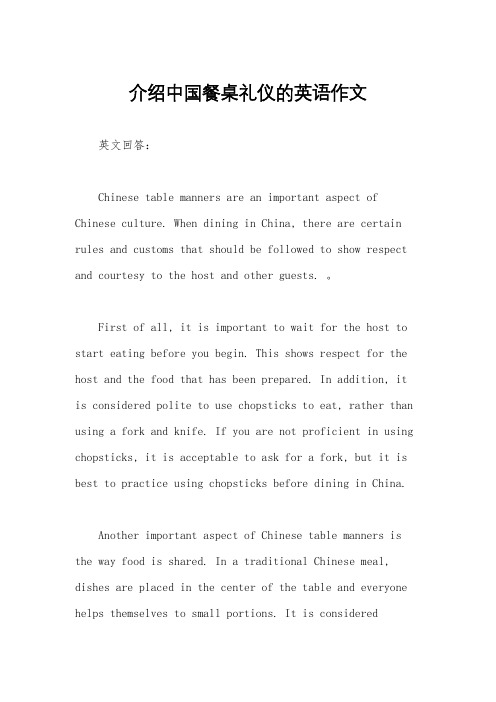
介绍中国餐桌礼仪的英语作文英文回答:Chinese table manners are an important aspect of Chinese culture. When dining in China, there are certain rules and customs that should be followed to show respect and courtesy to the host and other guests. 。
First of all, it is important to wait for the host to start eating before you begin. This shows respect for the host and the food that has been prepared. In addition, it is considered polite to use chopsticks to eat, rather than using a fork and knife. If you are not proficient in using chopsticks, it is acceptable to ask for a fork, but it is best to practice using chopsticks before dining in China.Another important aspect of Chinese table manners is the way food is shared. In a traditional Chinese meal, dishes are placed in the center of the table and everyone helps themselves to small portions. It is consideredimpolite to take a large portion of food or to reach over someone else's plate. Instead, it is best to serve others before serving yourself.Furthermore, it is customary to offer a toast during the meal, especially at formal occasions. When making a toast, it is important to hold the glass lower than the person you are toasting, as a sign of respect. It is also polite to wait for the host or the most senior person at the table to make the first toast before making your own.In addition to these rules, there are also some taboos to be aware of. For example, it is considered rude to stick your chopsticks upright in a bowl of rice, as this resembles a funeral ritual. It is also impolite to make loud noises while eating, such as slurping or burping.Overall, understanding and following Chinese table manners is important when dining in China. By observing these customs, you can show respect for the host and other guests, and fully enjoy the dining experience in China.中文回答:中国的餐桌礼仪是中国文化中的重要组成部分。
- 1、下载文档前请自行甄别文档内容的完整性,平台不提供额外的编辑、内容补充、找答案等附加服务。
- 2、"仅部分预览"的文档,不可在线预览部分如存在完整性等问题,可反馈申请退款(可完整预览的文档不适用该条件!)。
- 3、如文档侵犯您的权益,请联系客服反馈,我们会尽快为您处理(人工客服工作时间:9:00-18:30)。
中国餐桌礼仪文化英文下面是我为大家整理的英文版中国餐桌礼仪加上翻译版哦!需要的参考以下。
中国餐桌礼仪文化英文版:1. admission etiquette. ask guests seated on the seats. please elderly guests in attendance were seated next to attendance at from the left side into the chair. admission dongkuaizi not after. what more do not come to beep. not to get up walk. if what happened to the owner notice. second, when the meal. ask guests. long the dongkuaizi. jiacai, each less. far from the food on their own eat some. meal not a voice. heshang also not a sound use kaitang i spoon a small drink and a small mouth. pawan front-lips not drink, soup, hot cool after zaikai. side not to drink while blowing some people prefer to chew food to eat. extraordinary feel like work is crisp chewing food, a very clear voices. this is not etiquette demands. extraordinary and everyone is eating together, as far as possible to prevent the emergence of this phenomenon.third: do not eat hiccup, other voices will not arise if there sneezing, changming involuntarily, such as the sound, it is necessary to say i am sorry.; i am sorry;. of the original cooler. within the words . to show regret.fourth if guests or elders give cloth dish. best use of chopsticks may also be the guests or elders far away from the dishes to their front, according to the habit of the chinese nation. dish is a one of the top. if thesame tables leadership, the elderly, the guests said. whenever of a new dish, let them first dongkuaizi. rotation or invite them to the first dongkuaizi. to show their importance.fifth: eat the head, fishbone, bones and other objects, not wangwaimian vomit, not onto the ground still. slowly to get their hands diezili, or close on their own or on canzhuobian prepared beforehand good on paper. sixth: to a timely manner about the time and people just a few humorous, to reconcile the atmosphere. guangzhaotou not eat, regardless of others, and do not devour and destroy the lavish meal, not jail sentence.7: it is best not to the dinner table tiya if it is to tiya, will use napkins or sign blocked their mouths.8: to clear the main tasks of the meal. must be clear to do business oriented. feelings or to the main contact. mainly or to eat. if it is the former, when attention should be paid to the seating arrangements. their main negotiators the seats near each other to facilitate conversations, or dredge emotion. if it is the after. need only pay attention to common-sense courtesy on the line, to focus on the appreciation of dishes,9: the last time left. must be expressed gratitude to the host. at the invitation of the owner or to their own homes after the house to show backchina is the etiquette of helping people, minsishiweitian, dining how can no rules! while stressing that no attention is three meals a day, but do not know know better than ok!1. inviting guests to notice, ruxi 6:00, 5:50才叫your elderly guests, it does not.2. hosts who looked to be late; guests should be 5-10 minutes late, and this is very considerate guests oh, and pay attention to grasp, natural host and the guest are huan.3. if sit round a table, facing the door of the main blocks, or back * walls, counters; emphasize some hotels will be used napkins distinction, the highest position napkins can not casually sit oh, unless you intend to good banquet woven?: d4. masters of the subject and object of the right hand side, the left hand side of the important guests; * gate facing the master, of course, is run errands entertain the peiqia sit you.5. guests do not directly to the members of a la carte and calling guidance, obediently waiting for the hosts who looked to be a la carte if guests really serious taboos or hobbies, and should be gently told the hosts who looked, the owner of natural putting his interests and meet guests little or significantly requirements.6. hosts who looked not need points or less grasping points, or holding food dishes, such as crab, lobster legs, ribs, and so on. for a meal to the three dishes such a rule no. what can be said etiquette!7. not a small amount of force will not object to others drink winewithout fragmentation feast!8. on the wine servings! foreigner likes to boast of skill, people may boast their own point-for the food, hosts who looked at carefully observed liangcai qi, every cup have drinks later, when immediately drank to welcome the start. . . like, rotating disk or right hand side indicate the subject and object moving first chopsticks. tuirang subject and object should not be too long, oh, we stomachs are hungry, it will eat you open! do not forget to eat the praise of some oh.9. after one of every dish, although the waiter and owner will still go before the subject and object, but not too rigidly stick with you, if just in front of me, dead people rotating disc, i would first folder a small taste of chopsticks !10. hosts who looked often to the disk will cater to the vast majority of guests; peiqia then added services to entertain; guests can not touch the hands of disk integrity and eat meals, the two sides are also huan you. 11. if there is no attendant at the food or chopsticks, gongbiao, jiacai the first time can be good, must not use their own chopsticks to pick in the session to pick, and even stirring! not everyone is like love, like you do not mind the saliva chopsticks! usually identified from their recent selection part.12. let chopsticks on the best food in their transition to a dish in only into the mouth. phase seem to be eating is not so urgent.13. when chewing food in the mouth, remember bijin lips is a major event, so to speak, falling objects, shishui spills, as well as to avoid a puma puma ji ji annoyance beep. 14. during the meal, or both before and after the meal, should be back straight, as far as possible but not later * chairs sit. during the meal, basically in the hands above the desktop. 15. the master of a very good appetite, and weight loss are guests, not the fanju oh.译:中国餐桌礼仪文化以下几点一.入座的礼仪.先请客人入座上席.在请长者入座客人旁依次入座,入座时要从椅子左边进入.入座后不要动筷子.更不要弄出什么响声来.也不要起身走动.假如有什么事要向主人打招呼.第二,进餐时.先请客人.长着动筷子.夹菜时每次少一些.离自己远的菜就少吃一些.吃饭时不要出声音.喝汤时也不要出声响,喝汤用汤匙一小口一小口地喝.不宜把碗端到嘴边喝,汤太热时凉了以后再喝.不要一边吹一边喝.有的人吃饭喜欢用咀嚼食物.非凡是使劲咀嚼脆食物,发出很清楚的声音来.这种做法是不合礼仪要求的.非凡是和众人一起进餐时,就要尽量防止出现这种现象.第三:进餐时不要打嗝,也不要出现其他声音,假如出现打喷嚏,肠鸣等不由自主的声响时,就要说一声真不好意思.;对不起;.请原凉.之内的话.以示歉意.第四;假如要给客人或长辈布菜.最好用公筷.也可以把离客人或长辈远的菜肴送到他们跟前,按我们中华民族的习惯.菜是一个一个往上端的.假如同桌有领导,老人,客人的话.每当上来一个新菜时就请他们先动筷子.或着轮流请他们先动筷子.以表示对他们的重视.第五:吃到鱼头,鱼刺,骨头等物时,不要往外面吐,也不要往地上仍.要慢慢用手拿到自己的碟子里,或放在紧靠自己餐桌边或放在事先预备好的纸上.第六:要适时地抽空和左右的人聊几句风趣的话,以调和气氛.不要光着头吃饭,不管别人,也不要狼吞虎咽地大吃一顿,更不要贪杯.第七:最好不要在餐桌上剔牙.假如要剔牙时,就要用餐巾或手挡住自己的嘴巴.第八:要明确此次进餐的主要任务.要明确以谈生意为主.还是以联络感情为主.或是以吃饭为主.假如是前着,在安排座位时就要注重.把主要谈判人的座位相互靠近便于交谈或疏通情感.假如是后着.只需要注重一下常识性的礼节就行了,把重点放在欣赏菜肴上,第九:最后离席时.必须向主人表示感谢.或者就此时邀请主人以后到自己家做客,以示回中国人乃礼仪之帮,民以食为天,用餐岂能没有规矩!虽然说讲不讲究都是一日三餐,但是知道总比不知道好吧!1。
